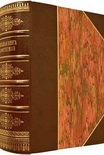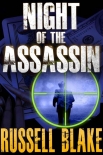The Gangster, Clive Cussler [ebook smartphone txt] 📗

- Author: Clive Cussler
Book online «The Gangster, Clive Cussler [ebook smartphone txt] 📗». Author Clive Cussler
The train started to roll, and Bell felt the rail and the ties vibrate with the heavy grinding of iron on steel. He fought to free his arm with the little strength he had left. The wheel flange—the iron lip that kept the train on the tracks—was inching down on him like a butcher’s slicing machine. He pounded the man’s kidneys. A heavy coat absorbed the blows, and the Black Hander did not budge. Bell bent his knee, dragged his ankle toward his free hand, and snatched his throwing knife out of his boot. He raised the knife. A protrusion from the moving chassis struck his hand, and the blade started to slip from his fingers. He squeezed hard and plunged it into his assailant’s kidney.
The man convulsed. Bell threw him off, jerked his arm from the rail, and flattened himself in the trough between the tracks. The car passed over him, as did the next stateroom car, the club car, the express car, and the tender. When at last the locomotive rolled away in gusts of steam and smoke, Bell sat up and took stock. He had two working hands. His neck began to ache savagely, and he was breathing hard, gasping to fill his lungs with the thin, smoky mountain air. The man who had stopped the train to attack Luisa Tetrazzini was staring at him with grinning teeth and empty eyes. Oddly, he seemed to have grown taller, until Bell observed that the head glaring blankly at him was on the far side of the rail, severed from its torso.
His stiletto had fallen beside his head.
Bell searched his coat for the sheath, then pocketed the weapon, retrieved his throwing knife, and staggered out of the tunnel.
Marion Morgan, a young, willowy straw-blonde with a beautiful, fine-featured face and a level gaze, was waiting at the railroad ferry pier. Isaac Bell sprang from the boat, ahead of the crowds, and swept her into his arms. “I am so glad to see you.”
They kissed warmly, oblivious to hundreds brushing past. After a while, Marion released him. “I cannot help but notice that you have an enormous bandage on your neck.”
“Cut myself shaving.”
“It looks like you’re still bleeding.”
“Just a scratch.”
“You’re white as a ghost.”
“Excitement . . . And joy.”
“Shouldn’t you be in a hospital?”
“I should be in bed. What are you doing for the afternoon?”
“But where is your opera singer?”
“I had Bronson’s boys meet the train at Oakland. They’ve got her covered.”
“Then come with me.”
“Where?” The last time he had seen her she was living in a tent, as were most in the earthquake-ravaged and fire-gutted city. From what he had seen from the ferry crossing the bay, not a lot had been rebuilt in the burned districts.
“I borrowed a sweet little cottage from my new boss.”
“What new boss?”
“I just got a wonderful job on a newspaper. I’ll tell you all about it. Later. After we change your bandage.”
In the short time they had been engaged, Isaac Bell had come to trust Marion’s judgment and insight totally. Experienced in business and trained as a lawyer at Stanford—graduating with the first class—she was the only person outside of his fellow detectives with whom he would discuss a case.
“The killer not only found Tetrazzini’s car in a dark tunnel swirling with smoke, but her exact stateroom window. He was well informed. Once again, I feel this so-called Black Hand bunch are considerably more organized than illiterate immigrants straight off the boat.”
“No doubt their leader is,” Marion conceded. “Did the railroad police happen to recognize the killer?”
“No. Why would they?”
“He attacked three thousand miles from New York, and he, or his henchmen, piled stones on the tracks ahead of your train, both of which suggest he was a California man following orders from New York. And he was obviously familiar with the railroad, so I’m wondering whether they had ever arrested him for stealing rides.”
She had changed into a silk robe that complemented her sea-coral green eyes, and Bell watched avidly as she prowled the tiny cottage, refilling their flutes with Billecart-Salmon Brut Rosé champagne and returning to their bed. “What do you think?” she asked.
“I think we should sleep on it.”
A heavy hand pounded the front door.
Marion called, “Who is it?”
“Bronson,” thundered through the wood. “You in there, Isaac?”
“What?”
“Russo’s in Ogden. I’ll slide the telegram under the door.”
Marion said, very sadly, “After I bandage your neck, I’ll ride the ferry with you to the train.”
11
Brewster Claypool was headed for Tammany headquarters, above Tony Pastor’s vaudeville house in an opulent three-story Italianate building on 14th Street, when he heard chorus girls singing Victor Herbert’s latest hit, “I Want What I Want When I Want It.”
He stepped into the theater.
They were rehearsing a spoof with a bandy-legged comedian, who was costumed in a yellow wig and short skirt. Claypool exchanged blown kisses with the girls and got a wave from the comedian, then climbed the stairs with a world-weary smile.
“I Want What I Want When I Want It” summed up with grim precision the job of pulling wires for J. B. Culp.
Boss Fryer—wan, potbellied “Honest Jim” Fryer—greeted Claypool expansively. He would have inquired about his family, if Claypool had one, so asked instead about mutual friends on Wall Street. Claypool reported on their successes and travails, and asked about Honest Jim’s family, who were prospering.
Jim Fryer ran the Tammany Hall political machine that ran New York City. Strict administrator of a party pecking order—district leaders down to election district leaders to block captains to saloonkeepers and building captains—he got out the vote on Election Day in the majorities required to beat the Reformers and dominated a confederation of police, clergy, streetcar magnates, and construction contractors.
They clinked glasses





Comments (0)